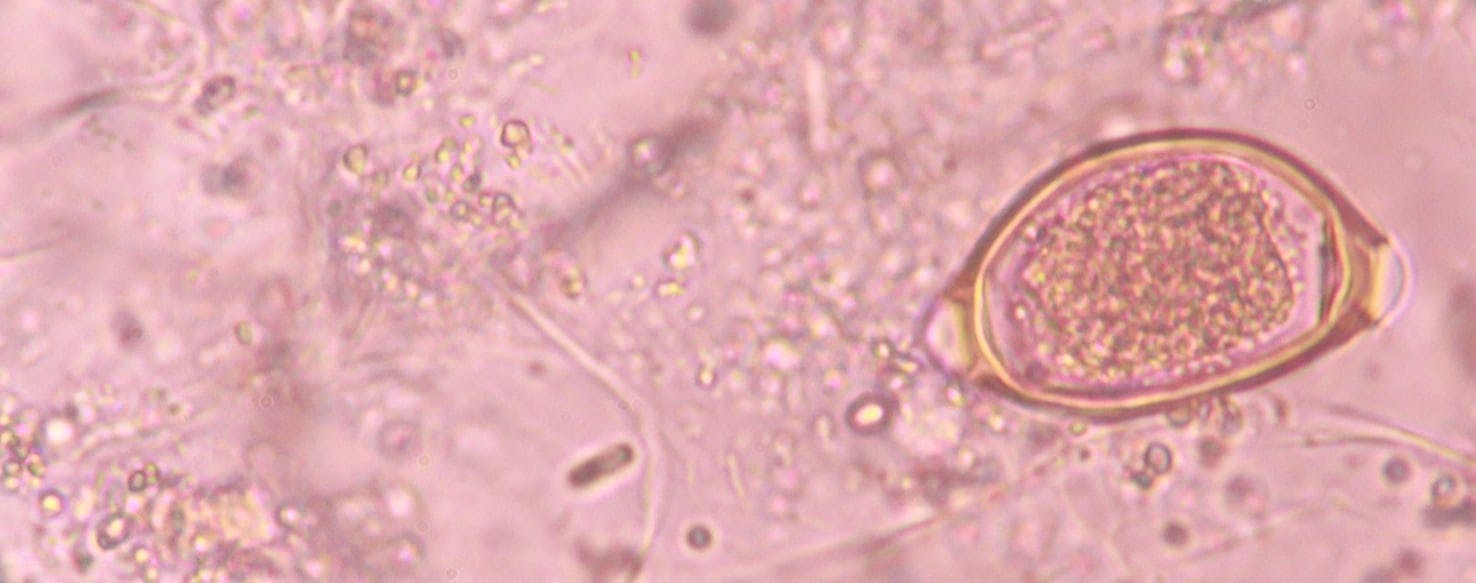Roundworms are parasites that live in the intestinal tract of your dog's digestive system. Roundworms can be found in animals as well as people. These earthworm-like creatures feed on food that is partially digested and can cause problems in your dog such as malnourishment. Puppies are especially susceptible to roundworms because they do not have immune systems which have fully developed. Roundworms can sometimes come from a puppy's mother while nursing. Roundworms can also be contagious coming from other animals, and roundworms can be seen living in the feces of your dog, which can also infest dogs that are cohabitating. The best way to deal with roundworms is not to have them at all. Therefore, you might want to consider roundworm prevention.
Causes and Prevention of Roundworm in Dogs
Dewormer and Preventive Medicines
Talk to your veterinarian about a deworming medication that will not only rid your dog of any worms she has, but that can also prevent future worms from residing inside your dog. Heartworm medications from your veterinarian are an excellent source of prevention for roundworms. These heartworm medicines also contain ingredients that will prevent roundworms in your dog. Be sure you are following up with your veterinarian for necessary vaccines and preventions for your puppy as she grows.
Until your puppy is old enough, approximately 8 to 10 weeks, you will need to keep an eye on her to ensure she is not contracting roundworms from her nursing mother. Keeping a close eye on a mother dog and her nursing pups will help to show you if roundworms have been passed from the mother to the puppies. A puppy with roundworms will appear malnourished but often with a round and swollen belly. If any of your puppies or your mother dog is diagnosed with roundworms, see your veterinarian for a dewormer for the rest of the litter to prevent roundworms from spreading any further. A good practice for a pregnant mother is to deworm before the puppies are born.
Good Hygiene Practices
Keeping your dog’s personal spaces and living areas free of dirt and feces is a great way to prevent roundworms in your dog. Because roundworms live in the intestines of dogs they often come out as a dog eliminates. If your dog is eliminating within your household, inside his crate, or in their bedding areas, be sure to keep those spaces clean and sanitized. Keep these areas safe and free of roundworm larvae and eggs that can attach themselves to your dog's body and quickly find their way into your dog's intestines, where they will continue to feast and thrive.
Keeping your dogs away from dogs infected with roundworm is also crucial. If you cannot keep
your dog separated from other dogs who have roundworm, watch his hygiene practices when near another dog. The typical greeting from dog to dog by way of sniffing could potentially cause inhalation of roundworm larvae living around the other dog’s behind. Keeping your dog groomed, bathed, and cleaned will also prevent roundworms from infesting your dog. Roundworms are typically found in dirty places and in feces. Keeping your dog away from unsanitary areas will not only help keep your dog hygienically clean, but also free of parasites.
No Unapproved Snacks
Because roundworms live in the intestines of animals and dogs are very often attracted to feces of other animals, you will want to keep your eyes on your dogs when they are around cat litter boxes or outside in public spaces-- even your own backyard. If your dog decides to munch on the feces of an animal who has roundworms they are likely to get roundworms themselves. If your dog has been diagnosed with roundworms, be sure to clean up their feces right away so another dog does not decide to come over and snack, infesting themselves with these parasites.
Roundworms can also be found in wild animals, so if you happen to see the feces of other animals around your home, keep your dog away from it and certainly don't allow your dog to sniff or snack. Avoid unsanitary dog parks or public places. If you choose to take your dog to a local dog park, be sure to choose one that is well-maintained where dog owners, as well as maintenance crew, work together to pick up after dogs, keep grasses short, and trash bins emptied. Allowing your dog to sniff and roam free in a dog park that is dirty and unsanitary could expose them to a parasite such as roundworms.
Importance of Prevention
Treating your dog with roundworms is not difficult to do. However, it does require a visit to your vet and the cost of medications to deworm your dog. Preventing your dog from contracting roundworms is fairly easy. Keep them in sanitary conditions away from the behinds and the feces of other animals and away from unsanitary public areas, and your dog should be just fine. Roundworms are very common, especially in young dogs, and they are treatable. If you have a female dog who is pregnant, consider deworming her before her puppies are born, so she is not passing roundworms to her puppies.
Simple Steps
Roundworms can certainly cause health issues for dogs and other animals, as well as people. Look for the signs and symptoms of roundworms such as a malnourished dog with a swollen belly. A swollen belly typically means roundworms have taken over your dog's intestines, and his intestines are so full his belly is protruding. Because roundworms are feasting on undigested foods, they are taking nutrients away from your beloved dog. If you suspect your dog has roundworms, please see your veterinarian for a check-up and diagnosis and treatment. But also remember: prevention is easy and part of maintaining a well-groomed dog in a healthy environment.


